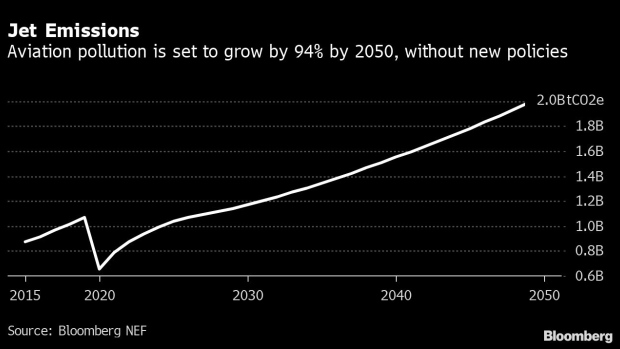Oct 4, 2021
Airline Industry Targets Net-Zero Carbon Emissions by 2050
, Bloomberg News

(Bloomberg) -- The airline industry’s main lobby group adopted a target of eliminating carbon emissions on a net basis by 2050, a goal that will require balancing the fight against climate change with the need to spur demand in the aftermath of the Covid-19 pandemic.
Current airline targets aren’t ambitious enough, International Air Transport Association Director General Willie Walsh said at the group’s annual meeting in Boston on Monday. At the same time, he said the industry will need help to make the transition from fossil-derived jet fuel.
“For aviation, net zero is a bold, audacious commitment,” Walsh said. “But it is also necessary.”
Airlines are under pressure to make quick progress toward lower emissions even though breakthrough technology like hydrogen-powered planes is years away. While automakers and the power industry have made tangible progress in becoming more green, aviation’s extended development timelines and safety prerogatives mean change has been slower.
While some carriers have committed to moving more quickly, the alternatives are limited: so-called sustainable aviation fuel is expensive and still scarce, while purchasing carbon offsets has been criticized as ineffective.
IATA’s update is the first since 2009. At that time, airlines pledged to cut CO2 output 50% by mid-century, though a subsequent boom in air travel saw emissions surge until the onset of the coronavirus. British Airways owner IAG SA, Delta Air Lines Inc. and United Airlines Holding Inc. have already made net-zero commitments.
JetBlue Airways Corp. Chief Executive Officer Robin Hayes, who serves as chairman of the IATA board this year, said the industry’s partners, like engine makers and airports, must help to achieve the goal.
“We need results, not just empty promises,” Hayes said.
Pre-pandemic, the global aviation industry caused about 2% of all CO2 emissions. The temporary, albeit sharp, fall due to people being stuck at home is unlikely to have any real impact on climate change because the gas stays in the atmosphere for hundreds of years. Airlines are also under pressure to bounce back from the downturn.
Walsh told Bloomberg News in June that IATA would propose the accelerated target to its membership.
Last month, British Airways operated what was billed as a “carbon neutral” flight between London and Glasgow. It used a combination of newer generation aircraft with more fuel efficient engines, optimal routing and sustainable aviation fuel.
Still, it also leaned heavily on carbon offsets, which have been criticized as it’s impossible to determine the extent to which they neutralize a flight’s emissions.
“If the sector is finally ready to address its emissions, then it should support Europe’s Green Deal policies which aim to apply an effective price on pollution and deploy cleaner jet fuel,” said Jo Dardenne, aviation manager at non-profit Transport & Environment, based in Brussels.
©2021 Bloomberg L.P.


